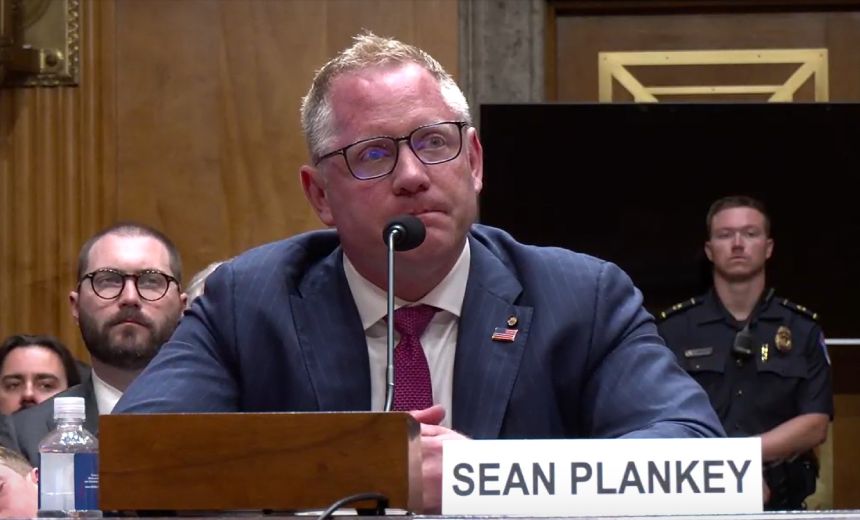Critical Infrastructure Security
,
Election Security
,
Fraud Management & Cybercrime
Sean Plankey Dodges Election Security Questions in Senate Confirmation Hearing

The Trump administration’s nominee to lead the nation’s top cyber defense agency declined to reject the false conspiracy theory that voting machine vulnerabilities and election fraud changed the outcome of the 2020 election during his confirmation hearing Thursday.
See Also: New Attacks. Skyrocketing Costs. The True Cost of a Security Breach.
Sean Plankey, a former Department of Energy and National Security Council cybersecurity official, appeared before the Senate Homeland Security and Governmental Affairs committee and fielded pointed questions from Democrats about his views on election infrastructure – one of CISA’s core oversight responsibilities.
Plankey has faced a series of setbacks and delays in his confirmation process, including FBI clearance issues and procedural holds (see: Trump’s Pick to Lead CISA is Stuck in Confirmation Limbo).
His nomination remains blocked by Sen. Ron Wyden, D-Ore., over an unreleased 2022 report on telecom vulnerabilities linked to the Salt Typhoon hack. Plankey told the Senate Homeland Security and Governmental Affairs Committee he has “not reviewed the cybersecurity posture of all 50 states” and deflected questions about the 2020 election, saying he had “not reviewed any of the cybersecurity of the 2020 election.” He avoided answering questions about whether the election was “rigged or stolen,” instead emphasizing that election security is handled by individual states, which use varying methods to safeguard their systems.
Democrats raised alarms over what they saw as political evasiveness on federal election security, a traditionally bipartisan issue until Trump in 2020 fired then-CISA Director Chris Krebs for affirming the 2020 election’s integrity. Sen. Richard Blumenthal, D-Conn., told Plankey: “If you can’t tell us with conviction and conscience that those elections were secure, I have very serious doubts about your ability to lead this agency.”
Despite Democratic concerns, Plankey – who enjoys strong backing from tech firms and the private sector – is expected to advance through the Republican-led committee and secure confirmation once his nomination reaches the Senate floor. Wyden told Information Security Media Group he will continue pressing for the release of the withheld CISA report, accusing the agency of a “multi-year cover up” of telecom sector cybersecurity failures and the agency’s own inadequate response to Chinese hacking threats.
“It’s ridiculous that CISA seems more concerned with covering up phone companies’ negligent cybersecurity than it is with protecting Americans from Chinese hackers,” Wyden said in an emailed statement. “Trump’s administration won’t act to shore up our dangerously insecure telecom system, it hasn’t gotten to the bottom of the Salt Typhoon hack and it won’t even let Americans see an unclassified report on why it’s so important to put mandatory security rules in place for phone companies.”
The Republican-led Senate can move Plankey’s nomination forward despite Sen. Wyden’s procedural hold, which adds delays and heightens the complexity of an already protracted confirmation process but doesn’t totally prevent it from proceeding. Wyden previously used the same tactic to stall Krebs’ nomination for the role while successfully pressuring the Department of Homeland Security to release details on mobile surveillance activity in Washington, D.C.
CISA did not respond to ISMG’s requests for comment about whether it plans to release the report.
During his confirmation hearing, Plankey voiced support for the State and Local Cybersecurity Grant Program, calling it “one of the best ways” to bolster cybersecurity for rural communities. He also indicated backing for efforts to reauthorize the Cybersecurity Information Sharing Act of 2015, describing it as “very critical” for protecting liability in information-sharing between businesses and government – a position he noted aligns with DHS Secretary Kristi Noem’s comments on the law.
CISA 2015 is set to expire on Sept. 30 and could face obstacles to reauthorization if revised language proves contentious. During Thursday’s hearing, Senate Homeland Security Chair Rand Paul, R-Ky., said the updated bill will include “anti-censorship language.” A lapse could disrupt public-private threat sharing (see: Key Cyber Law’s Lapse Could Mute Threat Sharing Nationwide).
